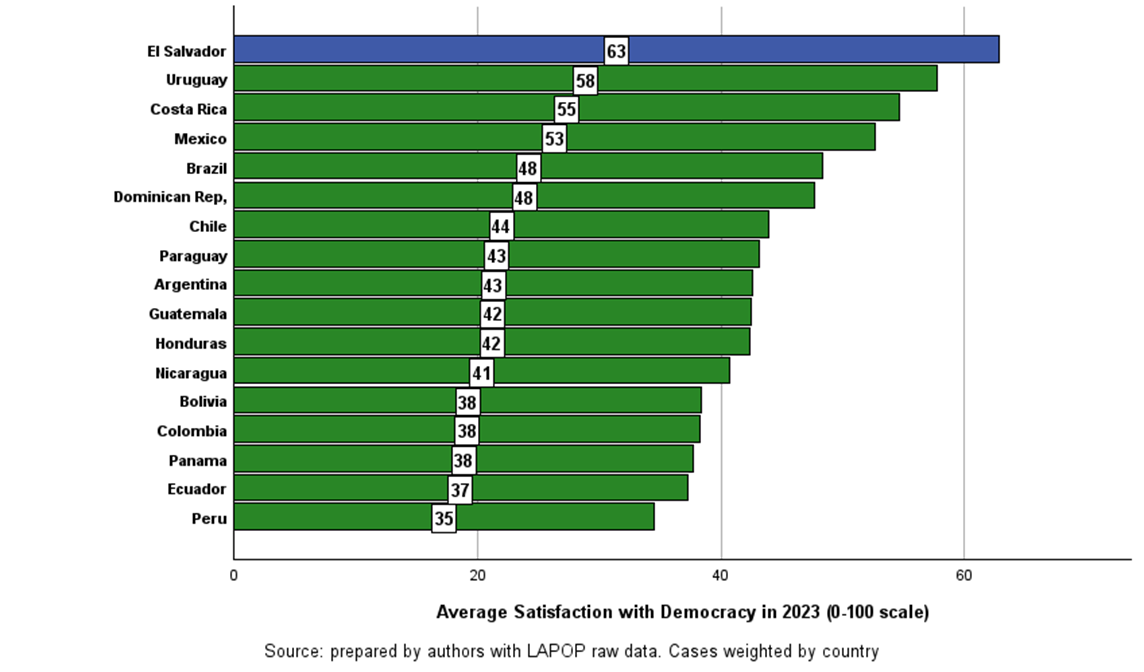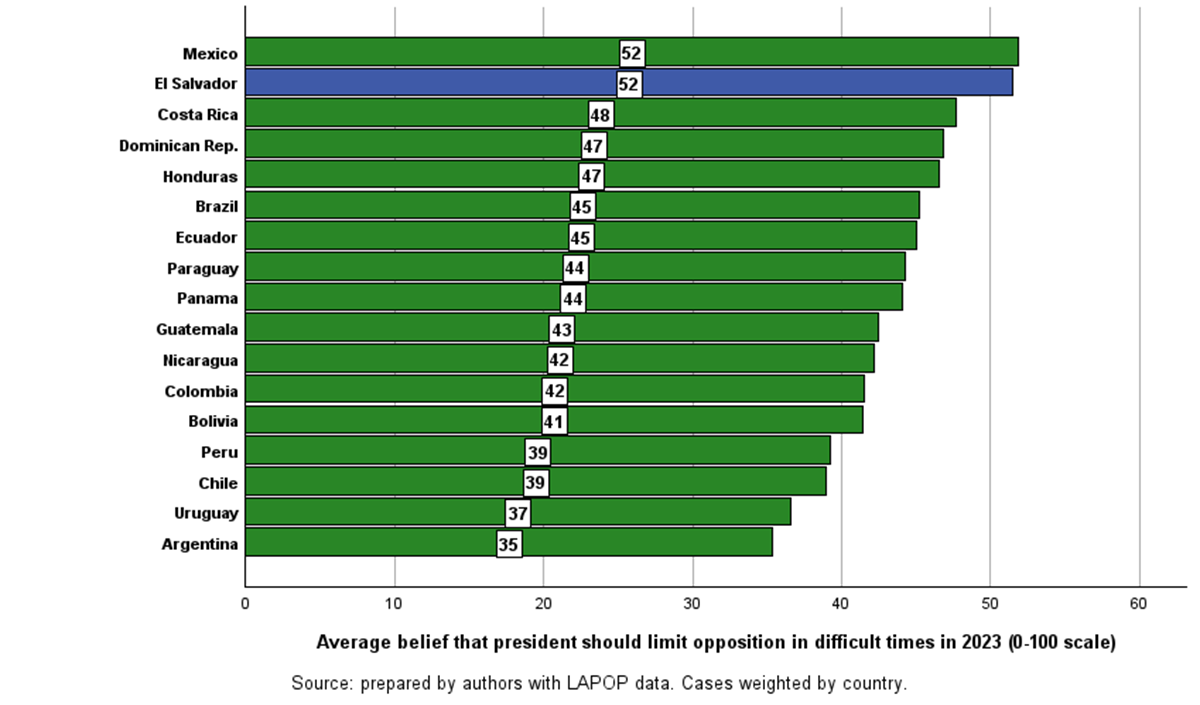Ecuador Votes on Constitutional Reforms and Popular Consultation
In this blog, Juan Terán Jurado analyses the recent Ecuadorian referendum and the four questions posed to the populace.
- Juan Terán Jurado
Blogs
On 4 February, it is a virtual certainty that Nayib Bukele will be reelected as President of El Salvador. In Canning House's latest blog, Dr Dinorah Azpuru, Dr Mary Fran Malone and Dr Christine Wade consider the factors driving Bukele towards reelection.



On 4 February, it is a virtual certainty that Nayib Bukele will be reelected as President of El Salvador. This comes despite articles of the country’s constitution forbidding presidential reelection.
Bukele won the 2019 presidential elections garnering 53% of the vote with the GANA (Grand Alliance for National Unity) party. His current party, Nuevas Ideas (New Ideas) won a supermajority in the 2021 legislative elections, controlling 56 of 84 seats in the National Assembly.
An iron-fisted approach to combatting gangs has marked Bukele’s tenure, under which more than 75,000 Salvadorans have been arrested, buttressed by a state of emergency that has been extended by his party-controlled legislature 22 times since March 2022. According to state-reported data, the country’s homicide rate was reduced to 2.4 per 100,000 in 2023 – a rate less than half that of the United States.
Security successes have been trailed by accusations of human rights violations, ranging from arbitrary detentions and mass trials, with thousands incarcerated without evidence of gang ties; to allegations of torture, and deaths in prisons. Bukele has also trained his sights on media reporting on gangs, amidst an apparent broader push against free journalistic expression in the country.
Polls indicate that Bukele enjoys as much as a 90-point lead over the candidates from El Salvador’s traditional parties, the National Republican Alliance (ARENA) and the Farabundo Martí National Liberation Front (FMLN) – neither of whom are polling above five percent. Nuevas Ideas is projected to expand its supermajority, winning as many as 95% of seats.
This is hardly surprising for a president enjoying record-high approval ratings, sometimes exceeding 90%, over the past five years. His security strategies have made him the most popular president in the Americas, with other leaders throughout the region eager to emulate his example.
Is support for Bukele based solely on improvements to El Salvador’s security situation? LAPOP survey data may help answer this question. Statistical analysis indicates that Salvadorans who perceive that their economy is doing well, and who have a higher perception of security and a lower perception of corruption among public officials, are more likely to vote for Bukele.
The percentage of Salvadorans who said that they felt ‘unsafe’ decreased notably between 2021 and 2023, from 40% to 16%. Still, Bukele’s hardline policies may have chipped his popularity in some quarters – while his approval rating in 2021 among those who felt ‘safe’ was 84 points, it decreased slightly to 79 points by 2023.
Those surveyed who intend to vote for Bukele typically expressed satisfaction with El Salvador’s democracy, and trust in congress and the judiciary. Meanwhile, they trusted the media less, and tended to believe that the president should place limits on the opposition during challenging moments. Indeed, data from 2023 show that satisfaction with democracy under Bukele was the highest of all Latin American countries, as shown by Figure 1.

Figure 1
However, as seen in Figure 2, support for unchecked presidential power in El Salvador in 2023 was also one of the region’s highest, behind only Mexico, another country run by a populist president. So, respondents may be satisfied with El Salvador’s democracy, but for many Salvadorans that democracy clearly does not preclude pushing the limits of executive power.

Figure 2
Additionally, while Bukele’s popularity has further expanded since the last election, the alignment of his support has shifted. Data from a Salvadoran public opinion institute show that Bukele was elected in 2019 largely by citizens who then self-identified as moderates. By 2023, according to LAPOP data, his support appears to be higher among Salvadorans who see themselves on the ideological right.
In sum, there is little doubt that Bukele will win the 4 February presidential vote, as voters overwhelmingly support his reelection, despite its unconstitutionality. While his support is not solely explained by improvements in the security situation, the sharp drop in violent crime has had a significant, positive impact.
Beyond security, Bukele’s rhetoric about his achievements, and his verbal attacks on journalists and his critics, both domestic and international (featured prominently on his social media accounts), may have helped him spin an image of a good national economy (despite a questionable economic performance) and anti-corruption accomplishments (notwithstanding a weak record on transparency).
That may also help explain the high levels of satisfaction with democracy and trust in institutions that bend to his desires – such as the legislature and Supreme Court. Nevertheless, the Economist Intelligence Unit found that El Salvador’s democracy has declined steadily since Bukele came to power in 2019, while V-Democracy has downgraded El Salvador, now classifying it as an ‘electoral autocracy.’
Professor of Political Science, Wichita State University (Kansas, USA) and Expert Advisor for LAPOP Guatemala at Vanderbilt University (USA)
Professor of Political Science, University of New Hampshire (USA)
Chair, Political Science, Washington College (USA); Louis L. Goldstein Professor of Public Affairs
Register for Canning House's webinar on 6 February:
This blog post was edited by Freddy Nevison-Andrews.
In this blog, Juan Terán Jurado analyses the recent Ecuadorian referendum and the four questions posed to the populace.
In this blog, Ricardo Avelar explains the significance of El Salvador's recent constitutional changes and how they may pave the way for a more authoritarian form of government.
By joining Canning House, you will become part of the UK's leading forum for informed comment, contacts and debate on Latin American politics, economics and business.
Just £50 per year.
All of Canning House's activities, including our upcoming events, insightful publications, latest news, and featured events from the UK-Latin America community.
In your inbox, every week, for free.